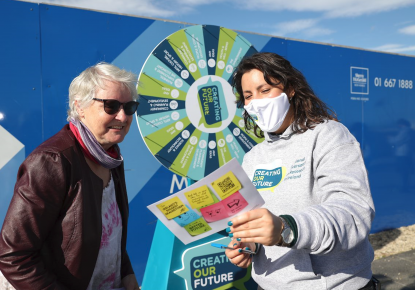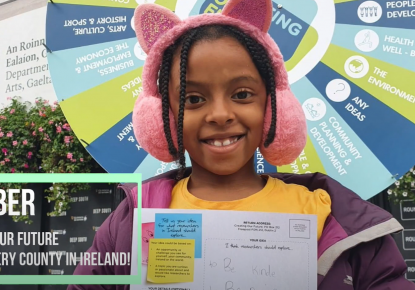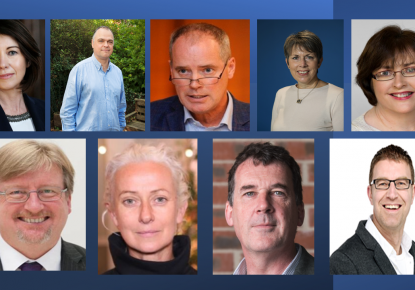You were asked to create the future — this is what you said
Linda Hogan, Professor of Ecumenics at Trinity College Dublin and Chair of the Expert Committee of Creating Our Future, writes that submissions to Creating our Future reveal a desire for one founded on values of inclusion, social justice and environmental sustainability. Creating our Future is an initiative unlike any other. A national conversation on research […]

Linda Hogan, Professor of Ecumenics at Trinity College Dublin and Chair of the Expert Committee of Creating Our Future, writes that submissions to Creating our Future reveal a desire for one founded on values of inclusion, social justice and environmental sustainability.
Creating our Future is an initiative unlike any other. A national conversation on research in Ireland, it engaged the public on the future on a scale never seen previously. Between July and November 2021 the public were invited to submit their ideas about what researchers in Ireland should explore to create a better future. It sought to engage people who are not usually invited to brainstorm about research and its role in Irish society.
Submissions could be made online, whilst the Creating Our Future roadshow visited towns and villages across the country to seed conversations about the future of research in Ireland. Researchers, policymakers, students and ambassadors exchanged ideas with people in town squares, community-centres and schools about the role that research can play in creating a more sustainable and equitable future.
The ideas flowed in. In total, 18,062 valid submissions were received from people of all ages and from different communities and counties. While many proposed ideas for researchers to explore, the majority of submissions spoke about people’s enduring concerns, their unmet needs, their priorities for the near and long term, their hopes for the future.
The submissions, which represent a snapshot in time reveal a desire for a holistic not a technocratic future, a future founded on the values of inclusion, social justice, and environmental sustainability. Research is seen to make a vital contribution to the creation of such a future, with a significant number of submissions highlighting the urgent need for research-informed policymaking across all sectors of society.
The task of reading, categorising and synthesising the 18,062 submissions was both compelling and complex. The Expert Committee along with 70 volunteer national and international researchers from across all disciplines, worked in seven multidisciplinary teams to analyse the findings and to bring their expertise to bear on ideas from the public. Uppermost in our minds was the need to foreground “the voice of the public”, to synthesise the submissions in a way that honoured that voice, and to suggest possible directions for future research rather than proposing a blueprint for researchers or a prioritisation of research themes.
The findings are organised into 16 themes distilled from multiple approaches to the analysis of the submissions themselves. Many submissions were relevant to several themes reflecting the entangled nature of many of the issues facing our societies. The themes not only convey the breadth of people’s interests and concerns but also highlight the conviction that research has a vital role to play in addressing them.
For each of the 16 themes there is a detailed account taken directly from the public’s submissions, accompanied by expert commentary contextualising the public voice, calls to action and nuggets of insight from the public. The themes are:
(1) A human-centric approach to health and social care
(2) Reimagining learning and development across the life course
(3) Advancing solutions for housing
(4) Safeguarding public interest and trust in the digital world
(5) Improving policymaking and the political system
(6) Promoting equality, diversity and inclusion in Ireland
(7) Fostering regional strengths
(8) Valuing and connecting communities
(9) Embedding climate action across society
(10) Supporting innovation in farming and food
(11) Future-proofing energy and water systems
(12) Connecting Ireland through green transport systems
(13) Nurturing humanities, culture and the arts
(14) Harnessing the benefits of fundamental research
(15) Building resilience and preparedness with insights from the pandemic
(16) Strengthening the research landscape and public engagement
Conventional silos and competing binaries (for example science versus humanities) find no resonance among the submissions. Rather concerns are described in a holistic manner and desired solutions are human-centric rather than technology-driven. However, as the report notes, there were surprisingly few submissions explicitly referencing research in the humanities in spite of the acknowledged importance of these disciplines for policymaking and for the promotion of individual and societal wellbeing.
For that reason, in addition to calling for greater investment in all disciplines, the expert committee recommended a greater focus on communicating the importance of research in the Arts and Humanities, including their contribution to addressing our societal challenges.
The committee’s recommendations arising from this consultation are far-reaching and address the research community, policymakers, politicians and government. Those addressed to researchers identify immediate areas for exploration and highlight the importance of collaboration across and between disciplines to address enduring problems. A second set of recommendations are directed at government and focus on systemic actions and investments that are essential to enable the research system in Ireland to flourish.
These include increased investment in research excellence across all disciplines and in interdisciplinary initiatives, public engagement initiatives that focus on communicating the nature of the research process itself, as well as the outcomes of research projects, the development of the research-policy interface to harness research in support of more effective policymaking, and the creation of an independent multidisciplinary Research Advisory Council to support the national research strategy.
Creating Our Future provides a unique reservoir of ideas to inspire future researchers and policymakers, catalyse new research areas, and encourage new forms of collaboration. The findings were submitted to Government and have already influenced national policy, through Impact 2030, and informed new research funding programmes, such as the National Challenge Fund.
Moreover, it affirms the public’s confidence in the value of research, its capacity to expand our knowledge and understanding, to support human flourishing (what Aristotle called eudaemonia) and to advance societal wellbeing.



